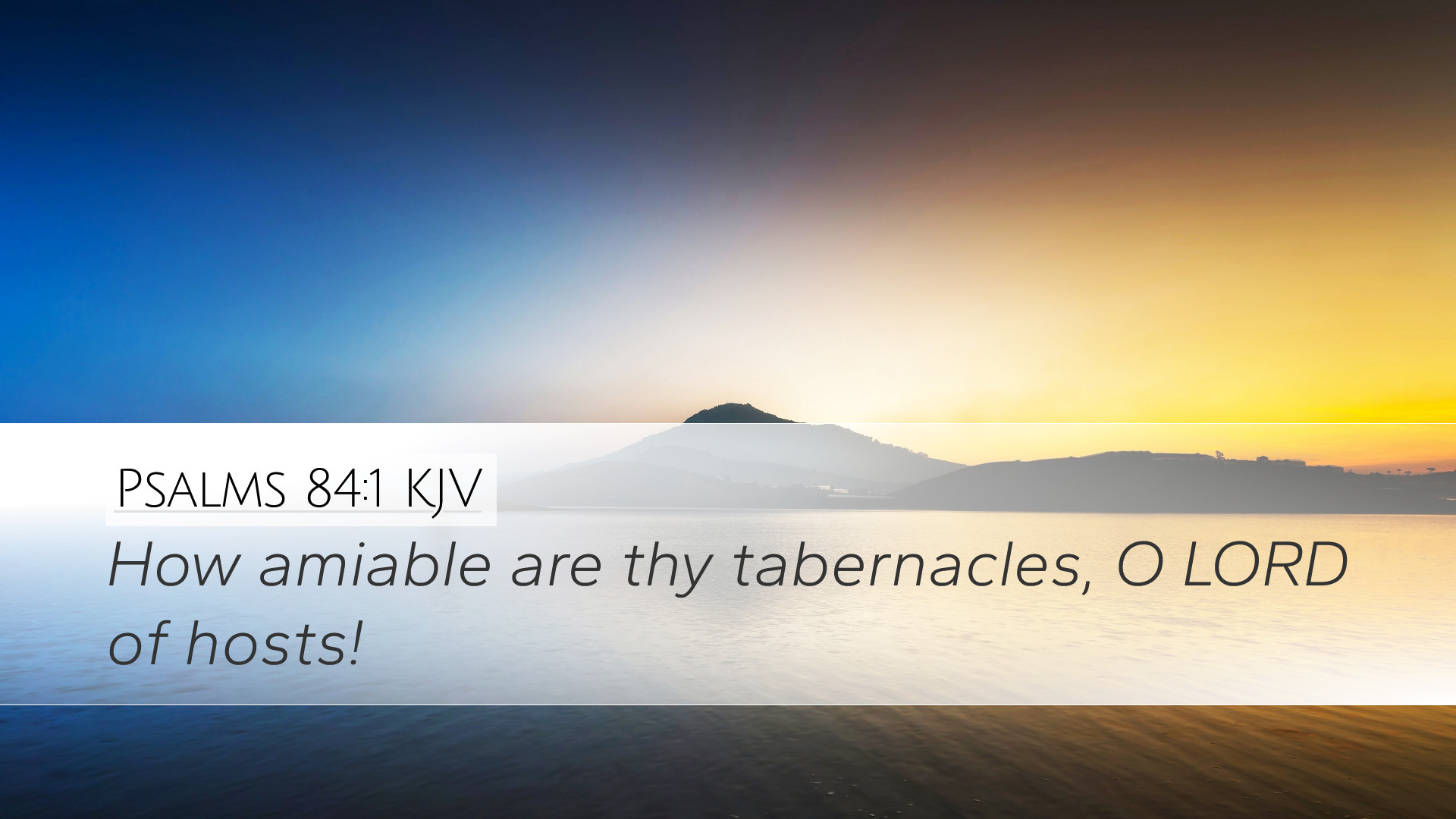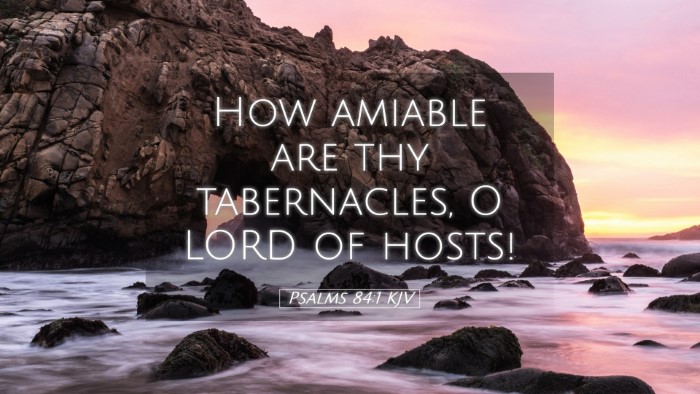Commentary on Psalms 84:1
Verse: "How amiable are thy tabernacles, O LORD of hosts!"
Introduction
The book of Psalms serves as a profound reflection of the human experience in relation to the Divine. In Psalm 84, the psalmist expresses a deep longing for the presence of God, particularly as found within His tabernacles. This verse encapsulates the beauty and desirability of the dwelling places of the Almighty. The various public domain commentaries provide rich insights into this text, revealing its theological, emotional, and spiritual significance.
Insights from Matthew Henry
Matthew Henry emphasizes the sacredness of God's dwellings. He describes the tabernacles as places of worship, where the presence of God resides. He notes that the psalmist's exclamation reflects a heart that is deeply attuned to the holiness and beauty of the Lord's house.
- Divine Beauty: Henry points out that the beauty of God's tabernacles stems not from their architecture but from the divine presence. He states, "The sight of the church appears amiable to those who have a spiritual inclination."
- Longing for Worship: The psalmist's sentiment reveals a longing for communal worship, underscoring the importance of the tabernacle as a place for believers to gather in reverence.
- God's Majesty: Henry articulates that the use of "amiable" signifies a deep affection and appreciation for God's house, wherein worshippers experience a taste of divine majesty.
Insights from Albert Barnes
Albert Barnes provides a thorough exegesis of this verse, emphasizing the joyful recognition of the tabernacles. He offers a few key observations:
- Context of the Psalm: Barnes notes that this psalm is a "Sons of Korah" composition, and it reflects a sense of exile or distance from the temple. There is an inherent yearning expressed for returning to the place of worship.
- Value of God’s Presence: The term "amiable" is discussed in relation to the affectionate regard in which God’s dwelling is held. Barnes encourages all believers to consider how they value their relationship with God.
- Encouragement for Believers: Barnes suggests this verse serves as a challenge for Christians to seek God actively, recognizing that His presence is where true comfort and peace reside.
Insights from Adam Clarke
Adam Clarke’s commentary offers a nuanced interpretation of the verse, shedding light on its theological implications:
- Emotional Response: Clarke highlights that the psalmist addresses God as "LORD of hosts," a title that emphasizes His power and authority over all creation. There is a depth of emotional connection evident in this address.
- Symbol of the Tabernacle: He elaborates on the nature of the tabernacles, noting that they symbolize the Old Testament worship. Clarke acknowledges that for the psalmists, these places were central to their identity and community.
- Reflection of Christ’s Influence: Clarke elaborates on how, in light of the New Testament, believers now become the temple of God, thereby enhancing the meaning of longing for divine presence in contemporary faith.
Theological Implications
This verse presents profound theological reflections, particularly regarding the nature of worship and the relationship between God and man:
- God’s Sovereignty and Presence: The verse indicates that God's presence is often experienced in specific places, invoking the significance of sacred spaces in worship.
- Human Longing for the Divine: The expression of longing reveals an innate human desire for communion with God, which is a recurring theme in the Scriptures.
- Community Worship: The emphasis on “tabernacles” highlights the importance of gathering in community, underlining that worship is not merely an individual experience but a shared journey.
Practical Applications
The essence of Psalms 84:1 transcends time and culture, providing modern believers with several takeaways:
- Prioritizing Worship: Pastors and church leaders can emphasize the importance of ensuring that worship spaces remain inviting and reflective of God’s glory.
- Fostering a Sense of Belonging: Addressing the communal aspect of worship, church communities can work to foster environments where members feel a profound connection to each other and to God.
- Encouraging Spiritual Longing: Encouraging congregations to cultivate a longing for God's presence, both in personal devotion and corporate gatherings, can lead to deeper spiritual experiences.
Conclusion
Psalms 84:1 serves as a potent reminder of the beauty and necessity of God’s presence in believers' lives. Through the insights from Matthew Henry, Albert Barnes, and Adam Clarke, we observe a multifaceted understanding of worship in the context of divine encounter. As believers, recognizing the significance of God’s tabernacles helps foster a deeper love for worship, a yearning for divine communion, and an appreciation of the sacred spaces that enrich our faith journey.


